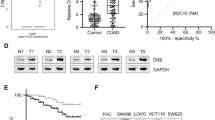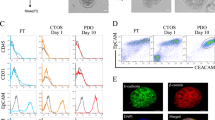Abstract
Human Klotho gene has many known functions such as anti-aging and anti-tumor, and decreased expression of this gene causes malignant formations in most types of cancer, including colon cancer. Interacting with TRAIL death receptors (DR4 and DR5) induces an apoptotic effect in cancer treatments by reducing the proliferation of cancer cells. The present study aimed to investigate downstream effect of overexpression of Klotho gene, which is known to have an antitumor effect on resistant human colon cancer cells, by examining its action on TRAIL death and decoy (DcR1 and DcR2) receptors for the first time. For this purpose, upregulation of human Klotho gene was achieved with CRISPR/Cas9-mediated system in resistant human colon cancer Caco-2 cells. To determine the effect of upregulation of Klotho gene on cancer cells evaluations with flow cytometry, WST-8, qRT-PCR, ELISA, and immunohistochemical analysis were performed. Then, Klotho gene was knocked out and its apoptotic effect was tested to find out whether it is due to overexpression of Klotho gene or not. Our results indicate that overexpression of Klotho gene in Caco-2 cells via CRISPR/Cas9-sensitized TRAIL death receptor DR4 suppresses the proliferation of cells by leading to apoptosis. Thus, this study conducted on apoptosis-resistant colon cancer cells may bring new insights about the role of Klotho gene in colon cancer.




Similar content being viewed by others
References
Li X-X, Huang L-Y, Peng J-J, Liang L, Shi D-B, Zheng H-T, Cai S-J. Klotho suppresses growth and invasion of colon cancer cells through inhibition of IGF1R-mediated PI3K/AKT pathway. Int J Oncol. 2014;45(2):611–8. https://doi.org/10.3892/ijo.2014.2430.
Tang X, Wang Y, Fan Z, Ji G, Wang M, Lin J, Huang S. Klotho: a tumor suppressor and modulator of the Wnt/β-catenin pathway in human hepatocellular carcinoma. Lab Invest. 2016;96(2):197–205. https://doi.org/10.1038/labinvest.2015.86.
Pan J, Zhong J, Gan LH, Chen SJ, Jin HC, Wang X, Wang L. Klotho, an anti-senescence related gene, is frequently inactivated through promoter hypermethylation in colorectal cancer. Tumour Biol. 2011;32(4):729–35. https://doi.org/10.1007/s13277-011-0174-5.
Shu G, Xie B, Ren F, Liu D-C, Zhou J, Li Q, Chen J, Yuan L, Zhou J. Restoration of klotho expression induces apoptosis and autophagy in hepatocellular carcinoma cells. Cell Oncol. 2013;6(2):121–9. https://doi.org/10.1007/s13402-012-0118-0.
Wang Y, Chen L, Huang G, He D, He J, Xu W, Zou C, Zong F, Li Y, Chen B. Klotho sensitizes human lung cancer cell line to cisplatin via PI3k/Akt pathway. PLoS ONE. 2013;8(2): e57391. https://doi.org/10.1371/journal.pone.0057391.
Ibi T, Usuda J, Inoue T, Sato A, Takegahara K. Klotho expression is correlated to molecules associated with epithelial-mesenchymal transition in lung squamous cell carcinoma. Oncol Lett. 2017;14(5):5526–32. https://doi.org/10.3892/ol.2017.6862.
Wolf I, Levanon-Cohen S, Bose S, Ligumsky H, Sredni B, Kanety H, Kuro-o M, Karlan B, Kaufman B, Koeffler H. Klotho: a tumor suppressor and a modulator of the IGF-1 and FGF pathways in human breast cancer. Oncogene. 2008;27(56):7094–105. https://doi.org/10.1038/onc.2008.292.
Chen B, Wang X, Zhao W, Wu J. Klotho inhibits growth and promotes apoptosis in human lung cancer cell line A549. J Exp Clin Cancer Res. 2010;29(1):1–7. https://doi.org/10.1186/1756-9966-29-99.
Zhu Y, Xu L, Zhang J, Xu W, Liu Y, Yin H, Lv T, An H, Liu L, He H. Klotho suppresses tumor progression via inhibiting PI 3 K/A kt/GSK 3β/Snail signaling in renal cell carcinoma. Cancer Sci. 2013;104(6):663–71. https://doi.org/10.1111/cas.12134.
Urakawa I, Yamazaki Y, Shimada T, Iijima K, Hasegawa H, Okawa K, Fujita T, Fukumoto S, Yamashita T. Klotho converts canonical FGF receptor into a specific receptor for FGF23. Nature. 2006;444(7120):770–4. https://doi.org/10.1038/nature05315.
Razzaque MS. The FGF23–Klotho axis: endocrine regulation of phosphate homeostasis. Nat Rev Endocrinol. 2009;5(11):611–9. https://doi.org/10.1038/nrendo.2009.
Kuro-o M. Klotho. Pflüg Arch Eur J Physiol. 2010;459(2):333–43.
Xuan NT, Van Hai N. Changes in expression of klotho affect physiological processes, diseases, and cancer. Iran J Basic Med Sci. 2018;21(1):3.
Behera R, Kaur A, Webster MR, Kim S, Ndoye A, Kugel CH, Alicea GM, Wang J, Ghosh K, Cheng P. Inhibition of age-related therapy resistance in melanoma by rosiglitazone-mediated induction of Klotho. Clin Cancer Res. 2017;23(12):3181–90. https://doi.org/10.1158/1078-0432.Ccr-17-0201.
Ligumsky H, Rubinek T, Merenbakh-Lamin K, Yeheskel A, Sertchook R, Shahmoon S, Aviel-Ronen S, Wolf I. Tumor suppressor activity of Klotho in breast cancer is revealed by structure–function analysis. Mol Cancer Res. 2015;13(10):1398–407. https://doi.org/10.1158/1541-7786.
Zhou X, Fang X, Jiang Y, Geng L, Li X, Li Y, Lu K, Li P, Lv X, Wang X. Klotho, an anti-aging gene, acts as a tumor suppressor and inhibitor of IGF-1R signaling in diffuse large B cell lymphoma. J Hematol Oncol. 2017;10(1):1–11. https://doi.org/10.1186/s13045-017-0391-5.
Camilli TC, Xu M, O’Connell MP, Chien B, Frank BP, Subaran S, Indig FE, Morin PJ, Hewitt SM, Weeraratna AT. Loss of Klotho during melanoma progression leads to increased filamin cleavage, increased Wnt5A expression, and enhanced melanoma cell motility. Pigment Cell Melanoma Res. 2011;24(1):175–86. https://doi.org/10.1111/j.1755-148X.2010.00792.x.
de Miguel D, Lemke J, Anel A, Walczak H, Martinez-Lostao L. Onto better TRAILs for cancer treatment. Cell Death Differ. 2016;23(5):733–47. https://doi.org/10.1038/cdd.2015.174.
Pitti RM, Marsters SA, Ruppert S, Donahue CJ, Moore A, Ashkenazi A. Induction of apoptosis by Apo-2 ligand, a new member of the tumor necrosis factor cytokine family. J Biol Chem. 1996;271(22):12687–90. https://doi.org/10.1074/jbc.271.22.12687.
Kretz A-L, Von Karstedt S, Hillenbrand A, Henne-Bruns D, Knippschild U, Trauzold A, Lemke J. Should we keep walking along the trail for pancreatic cancer treatment? Revisiting TNF-related apoptosis-inducing ligand for anticancer therapy. Cancers. 2018;10(3):77. https://doi.org/10.3390/cancers10030077.
Zhang B, Liu B, Chen D, Setroikromo R, Haisma HJ, Quax W. Histone deacetylase inhibitors sensitize TRAIL-induced apoptosis in colon cancer cells. Cancers. 2019;11(5):645. https://doi.org/10.3390/cancers11050645.
Zhang Z, Li Z, Wu X, Zhang C-F, Calway T, He T-C, Du W, Chen J, Wang C-Z, Yuan C-S. TRAIL pathway is associated with inhibition of colon cancer by protopanaxadiol. J Pharmacol Sci. 2015;127(1):83–91. https://doi.org/10.1016/j.jphs.2014.11.003.
Segawa K, Kurata S, Yanagihashi Y, Brummelkamp TR, Matsuda F, Nagata S. Caspase-mediated cleavage of phospholipid flippase for apoptotic phosphatidylserine exposure. Science. 2014;344(6188):1164–8. https://doi.org/10.1126/science.1252809.
Dai X, Zhang J, Arfuso F, Chinnathambi A, Zayed M, Alharbi SA, Kumar AP, Ahn KS, Sethi G. Targeting TNF-related apoptosis-inducing ligand (TRAIL) receptor by natural products as a potential therapeutic approach for cancer therapy. Exp Biol Med (Maywood). 2015;240(6):760–73. https://doi.org/10.1177/1535370215579167.
Nahacka Z, Svadlenka J, Peterka M, Ksandrova M, Benesova S, Neuzil J, Andera L. TRAIL induces apoptosis but not necroptosis in colorectal and pancreatic cancer cells preferentially via the TRAIL-R2/DR5 receptor. Biochim Biophys Acta Mol Cell Res. 2018;1865(3):522–31. https://doi.org/10.1016/j.bbamcr.2017.12.006.
Thamkachy R, Kumar R, Rajasekharan K, Sengupta S. ERK mediated upregulation of death receptor 5 overcomes the lack of p53 functionality in the diaminothiazole DAT1 induced apoptosis in colon cancer models: efficiency of DAT1 in Ras-Raf mutated cells. Cancer Commun (Lond). 2018;38(1):43. https://doi.org/10.1186/s40880-018-0309-9.
Qiao X, Wang X, Shang Y, Li Y, Chen S-Z. Azithromycin enhances anticancer activity of TRAIL by inhibiting autophagy and up-regulating the protein levels of DR4/5 in colon cancer cells in vitro and in vivo. Cancer Commun (Lond). 2018;38(1):43. https://doi.org/10.1186/s40880-018-0309-9.
Gravett AM, Dalgleish AG, Copier J. In vitro culture with gemcitabine augments death receptor and NKG2D ligand expression on tumour cells. Sci Rep. 2019;9(1):1–9. https://doi.org/10.1038/s41598-018-38190-2.
Lee J, Jeong D-J, Kim J, Lee S, Park J-H, Chang B, Jung S-I, Yi L, Han Y, Yang Y. The anti-aging gene KLOTHO is a novel target for epigenetic silencing in human cervical carcinoma. Mol Cancer. 2010;9(1):1–10. https://doi.org/10.1186/1476-4598-9-109.
Zhou Y, Zheng S, Luo Q, Huang X, Li Z. Hypermethylation of DcR1, DcR2, DR4, DR5 gene promoters and clinical significance in tongue carcinoma. Am J Otolaryngol. 2019;40(6): 102258. https://doi.org/10.1016/j.amjoto.2019.07.002.
Gura T. How TRAIL kills cancer cells, but not normal cells. Science. 1997;277(5327):768–768. https://doi.org/10.1126/science.277.5327.
Hersey P, Zhang XD. How melanoma cells evade trail-induced apoptosis. Nat Rev Cancer. 2001;1(2):142–50. https://doi.org/10.1038/35101078.
Kim K, Fisher MJ, Xu S-Q, El-Deiry WS. Molecular determinants of response to TRAIL in killing of normal and cancer cells. Cancer Res. 2000;6(2):335–46.
Acknowledgements
This study was supported by Eskişehir Osmangazi University, Scientific Research Projects (ESOGU-BAP, ESTEM project code: 2020/46014). The funders had no role in design of the study; in collection, analyses, or interpretation of data; in writing of the manuscript; or in decision to publish the results.
Author information
Authors and Affiliations
Contributions
Idea/concept: SG, OU, AES; design: OU; control/supervision: AES, TS S; literature review: SG, MNS, OU; writing the article: SG, OU, AES, MNS; critical review: AES, OU, SG. All authors have read and approved the final manuscript.
Corresponding author
Ethics declarations
Conflict of interest
Authors declare that there are no conflicts of interest.
Ethical approval
Not applicable.
Additional information
Publisher's Note
Springer Nature remains neutral with regard to jurisdictional claims in published maps and institutional affiliations.
Rights and permissions
About this article
Cite this article
Gunes, S., Soykan, M.N., Sariboyaci, A.E. et al. Enhancement of Apo2L/TRAIL signaling pathway receptors by the activation of Klotho gene with CRISPR/Cas9 in Caco-2 colon cancer cells. Med Oncol 38, 146 (2021). https://doi.org/10.1007/s12032-021-01595-7
Received:
Accepted:
Published:
DOI: https://doi.org/10.1007/s12032-021-01595-7




